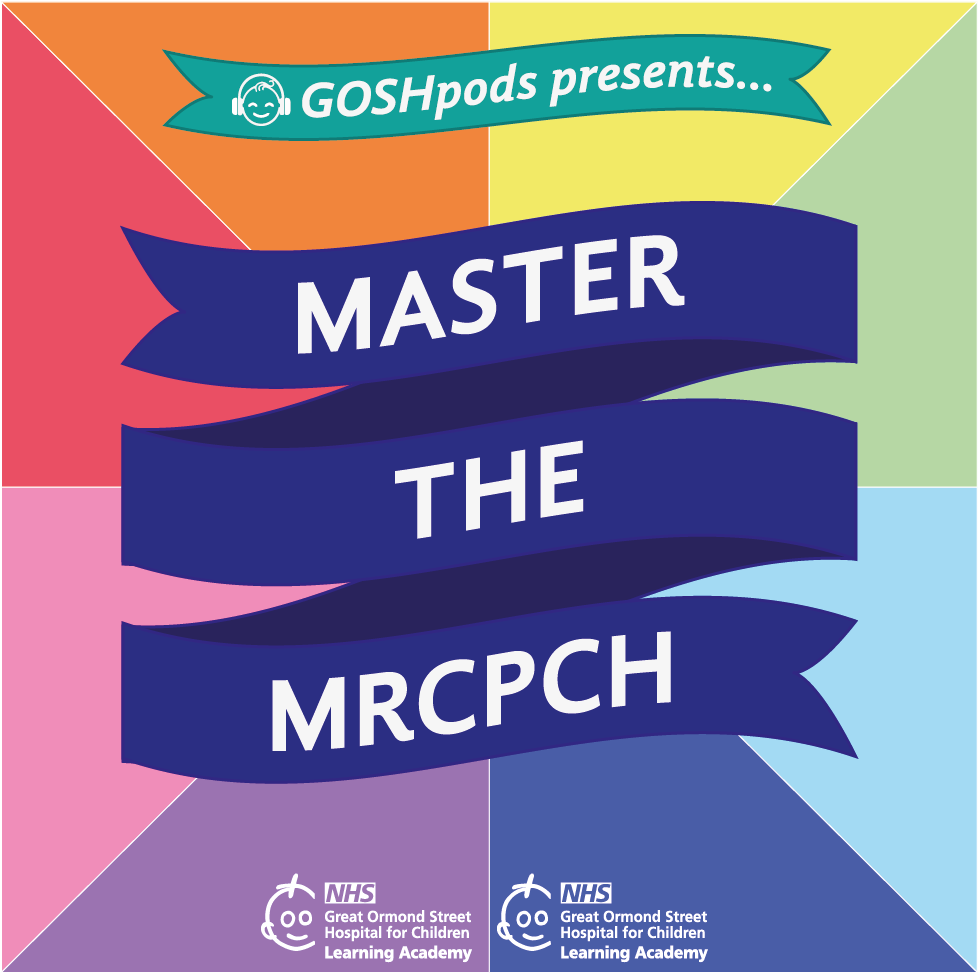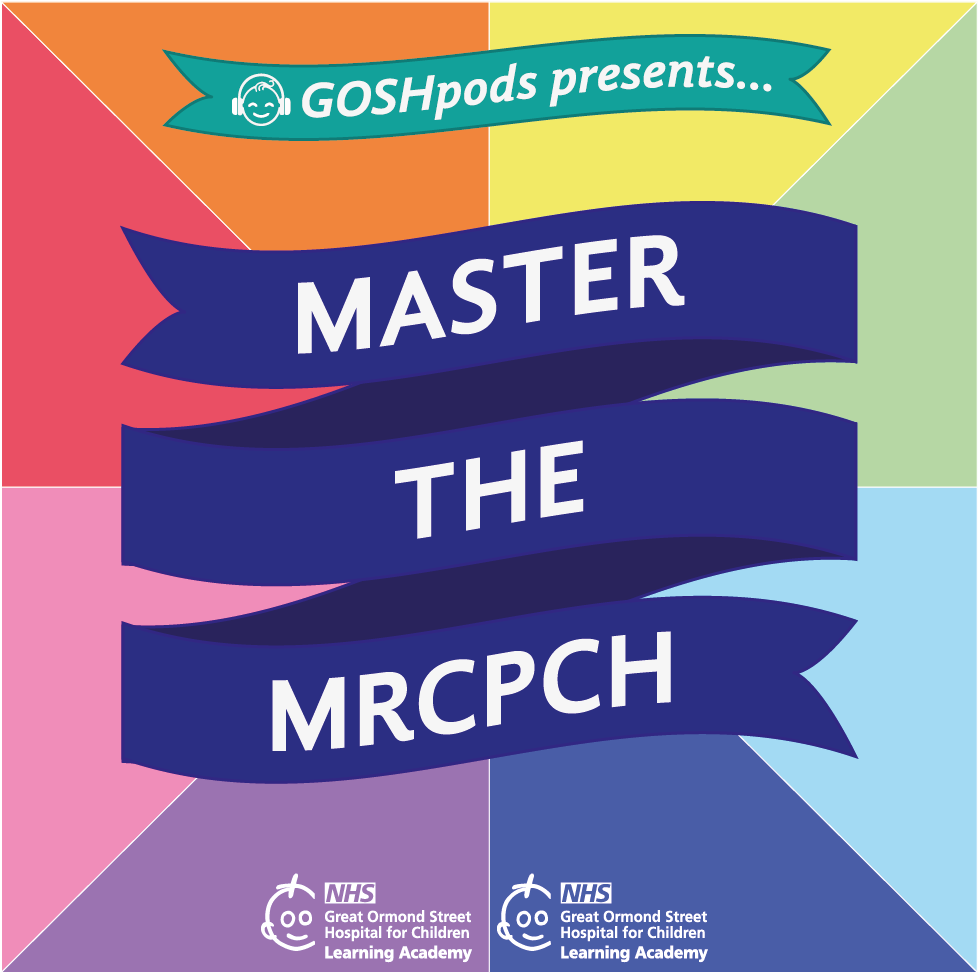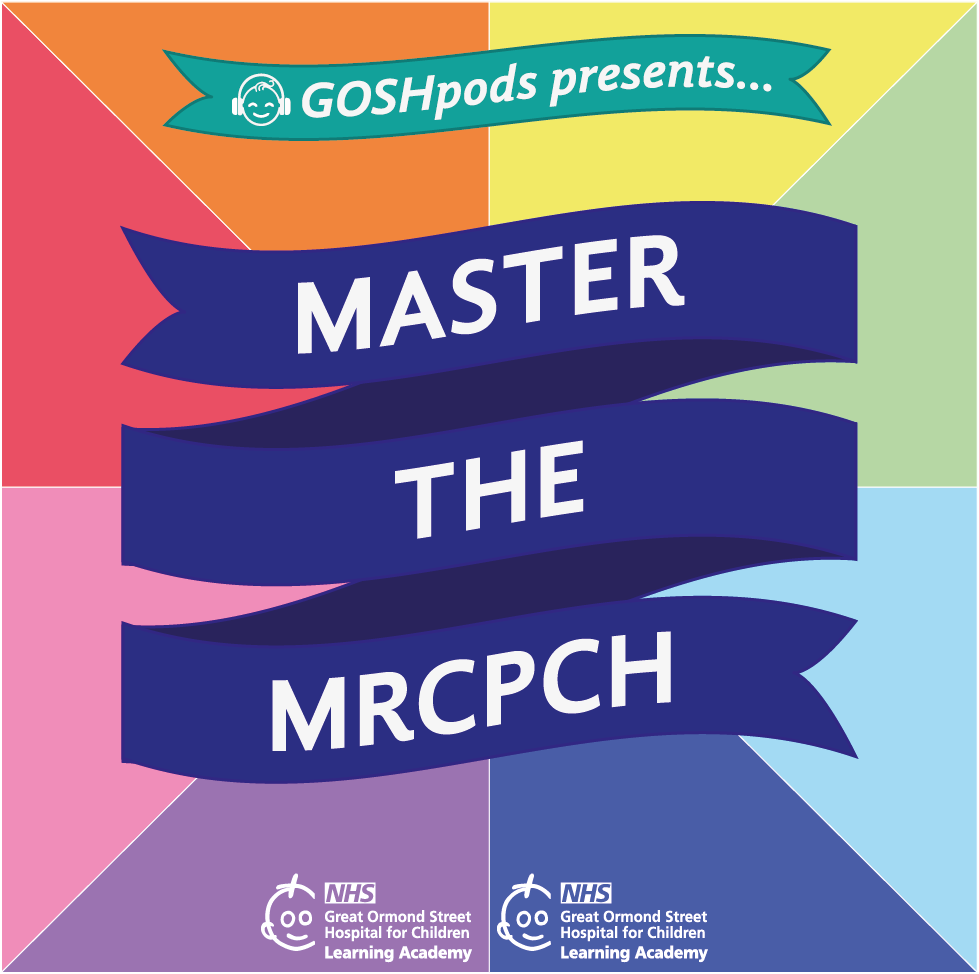This Podcast is brought to you by the GOSH Learning Academy.
SA: Hello, and welcome to Master the MRCPCH. In this series, we tap into the expertise here at Great Ormond Street Hospital to give you an overview of a topic on the RCPCH exam curriculum. So whether you're revising for an exam or just brushing up on a need to know topic, hopefully this podcast can give you the information that you need.
I'm Dr. Sarah Ahmed, a paediatric registrar and the current digital learning education fellow here at GOSH.
In today's episode, we're going to be talking to Dr. Maria Zahoor, a clinical fellow in dermatology at Great Ormond Street Hospital, about Henoch Schönlein Purpura, or HSP. We're going to cover the aetiology, presentation, examination, investigation, and management of this condition. HSP corresponds to the dermatology section of the exam curriculum.
Maria, thank you so much for speaking with us today.
MZ: Pleasure to be here. Thanks, Sarah.
SA: So I wanted to start how we always start by asking you, what would you like people to get out of listening to this podcast?
MZ: Actually it's very common to have a child with purpuric rash in exam or in clinical setting, and this podcast will help a bit in general to remember the common causes of purpuric rashes but specifically the focus will be on presentation, signs and symptoms, and management of Henoch Schönlein Purpura as I feel it is one of those rashes that doctors are always on the lookout for. And as Henoch Schönlein Purpura is an absolute mouthful, I am going to refer to it as HSP for the rest of the episode.
SA: Absolutely fine. I completely agree. It's an absolute mouthful. And it is absolutely one of those rashes that we are always looking out for. And I think sometimes might even be over diagnosed.
So like you said and I can't even pronounce this properly, but Henoch Schönlein Purpura is an interesting name. Can you tell us a little bit about the history of that name?
MZ: Yeah, so this condition has got a bit of history as well. It is named after a German paediatrician, Heinrich Henoch, and his teacher, Lukas Schönlein, who described it in 1860s. So Schönlein explored the association of purpura and arthritis, and Henoch described the purpura and gastrointestinal manifestations.
But before that English physician William Heberden and the dermatologist Robert Willan had already described the condition in early 1800s. But the name Heberden-Willan disease has somewhat fallen into disuse. Also, in 2012, the International Chapel Hill Consensus Conference For Nomenclature of Vasculitic Conditions replaced HSP with immunoglobulin A or IgA vasculitis, as it better reflect the pathophysiology. However, still the two terms are still used interchangeably in clinical practice.
SA: Before we go into more detail, can you give us a definition or a brief overview of what HSP is?
MZ: Sure. So HSP is a condition that causes the small blood vessels in the skin, joints, intestines and kidneys to become inflamed and bleed. So basically it's a type of vasculitis in which for some reason, the immune system attacks healthy blood vessels.
SA: And is HSP a common condition?
MZ: It is in fact the most common vasculitis of childhood. It occurs worldwide. Its incidents is 20 per hundred thousand children per year and seen in boys more than girls. 90% cases of HSP occur in children, usually between the ages of two to 10 years. HSP is distinctly less common in adults, but if it occurs, the course of illness is usually severe with chronic complications.
SA: Oh, I didn't even realize it could develop in adults. I truly thought it was just a condition of childhood. Do we have a sense of the pathophysiology behind HSP? Do we know what causes it?
MZ: Actually we do not know exactly what causes HSP but it seems to follow on some viral or bacterial infections such as cold or respiratory tract infection. And it's more common in winter and spring rather than summer. So it's thought to be triggered by body reacting to some sort of infection.
SA: And can you tell us a little bit about this rash? So what is it that you're looking for?
MZ: Yes. Actually the hallmark of HSP is its rash as the skin is affected in almost all the cases of HSP. So this rash is usually gets started as pink macules and developing into petechiae, raised purpura, which is palpable or larger, ecchymosis as well. And very rarely or occasionally rash can turn into ulcers also. So the rash does not blanch under pressure.
It is important to differentiate it from other conditions which also present with the rash. So there are some conditions like meningococcaemia, which also presents with non blanchable rash, but child with meningococcaemia will usually be acutely unwell as compared to HSP. Signs of systemic instability and meningitis often help to differentiate meningococcaemia from HSP. Also, the skin lesions in HSP are usually symmetrical, and they occur more in gravity dependent areas like lower extremities or buttocks.
We have got another condition called idiopathic thrombocytopenic purpura, short form is the ITP, so it can also be considered in the differentials. And very similar to the HSP, the child with this condition is also very stable and well. So the rash in ITP is due to low platelet count on blood film rather than vasculitis.
So children with leukaemia can also present with purpuric rash, but of course, a detailed systemic examination with particular focus on reticuloendothelial system and blood film will also help us to differentiate HSP from leukaemias.
Another thing to consider in mind is the coagulation disturbances like haemophilia, von Willebrand disease, and disseminated intravascular coagulation. They can also present with purpuric rashes. And of course we can detect on the blood work and the history can also give us the clue.
And other vasculitis like systemic lupus erythematosus, and microscopic polyangiitis, polyarthritis nodosa, they can also present with rash, but history, thorough physical exam and labs will help us to differentiate from HSP. And then we have also got acute haemorrhagic oedema. It can also sometimes present like HSP, but it's important to note that usually we can see this condition in children who are younger than two years. And also there is the absence of other organ involvement, which we tend to see in HSP kids. And acute post streptococcal glomerulonephritis and haemolytic uremic syndrome, they also have some clinical manifestations similar to HSP.
SA: It's not just the rash, is it, that children present with when they have HSP. Can we talk a little bit about the other common clinical or presenting features?
MZ: Sure. As we already know, that it's a systemic vasculitis, so it's very common to see the extra cutaneous manifestations like musculoskeletal involvement that includes arthritis or arthralgia. It is common and seen in around 75% of cases of HSP. So the arthritis in HSP, it tends to be self-limited. It's oligoarticular and it has got a predilection for the lower extremities. And it does not lead to deformities, like we see in the conditions with juvenile idiopathic arthritis.
And gastrointestinal manifestations of HSP occur in around 80 percent of children with HSP, and in that include abdominal pain, vomiting, diarrhoea, melena, intussusception. Mesenteric ischemia and intestinal perforation aren’t common though, but can happen.
And one thing is very important, that is the renal involvement. It occurs in 40 to 50% of HSP children, and that includes microscopic haematuria, frank haematuria, proteinuria, nephrotic or nephritic picture, renal failure, and hypertension.
We can also see the neurologic manifestations of HSP caused by hypertension or central nervous system vasculitis. They include intracerebral haemorrhage, seizures, headache, and behaviour changes.
Very less common manifestations of HSP are orchitis, and pulmonary haemorrhage.
SA: Do you always get high blood pressure in HSP?
MZ: So it's not always, but when the child is in the renal failure, so the hypertension is secondary to renal failure. So it's important to keep an eye on the blood pressure of the child.
SA: Did you know that GOSH runs mock exams for the MRCPCH? Great Ormond Street has been running mock exams since June 2016. The mock is based on the MRCPCH clinical examination curriculum, and candidates are able to get the full experience and conditions of a real exam setting, and gain valuable feedback on their performance.
To find out more go to the GOSH website and search MRCPCH exams.
SA: And so say you have a child in A&E or on the ward that you suspect might have HSP. What are the investigations that you would do to confirm the diagnosis?
MZ: So the diagnosis of HSP is usually made clinically and it's often straightforward, especially when the typical rash is present. And there is no specific laboratory diagnostic test. We can perform the biopsies of the skin and kidney, which can provide important diagnostic information in the cases which are atypical or very severe, and it can show immunoglobulin A deposition in affected tissues. But is often unnecessary in a typical case of HSP.
Assessment of renal involvement with blood pressure, urine analysis, serum creatinine is very necessary. So, if we see a child whom we are suspecting HSP, it's necessary to take the blood pressure and perform the urine test and the creatinine. And full blood count, blood film and clotting screen is usually being done to exclude the differentials, which I have mentioned earlier.
And we can offer, consider doing ultrasound in the setting of gastrointestinal complaints to look for bowel wall oedema. And it can also pick up intussusception.
SA: Is there any benefit in doing um, rheumatological blood tests like ANCA?
MZ: It can be considered if we are thinking the rash being the manifestation of some other vasculitis, vasculitic additions, which I mentioned earlier, like SLE or microscopic polyangiitis, but in the initial baseline workup of a typical rash of HSP and that we can limit ourself to that. But yeah, of course it depends on further how the illness presents.
SA: Yeah, of course. And what I would say is that almost every hospital has got a guideline for HSP, so before you do anything, make sure you check.
MZ: Yeah, yeah. It's better to follow the local guidelines. Yeah.
SA: And so, say you've then gone on to diagnose this child with HSP, how would you go about managing them?
MZ: The course of HSP is self-limited and treatment is mainly supportive, but the emphasis of our management should be on maintaining adequate nutrition, hydration, analgesia and rest. Steroids are most often used to treat significant gastrointestinal involvement or other life threatening manifestations. Intravenous immunoglobulin and plasma exchange are sometimes used in the setting of severe disease. And chronic HSP renal disease is managed with a variety of immunosuppressants, including azathioprine, cyclophosphamide, cyclosporine.
SA: And what's the prognosis for a child who might have HSP?
MZ: Overall, so the prognosis of a child with HSP is excellent. In some studies, it's mentioned that around 94%, so most of the children experience an acute self-limited course lasting on average up till four weeks. And one third of children with HSP experience one or more recurrences, and that happens typically within four to six months. And usually with each relapse, the symptoms are usually milder than at the initial presentation.
And acute complications like intestinal perforation, although unusual, but they impart significant morbidity and mortality. And in terms of long-term complications, so renal disease is seen in 1 to 2 percent of children with HSP and children who present with HSP nephritis, 8 percent of them develop end stage renal disease. And when that happens, they require haemodialysis or equivalent renal replacement therapy. And renal disease can develop up to six months after diagnosis, although it's unlikely if initial urine analysis findings are normal, but it's recommended that children with HSP should undergo serial monitoring for blood pressure and urine analysis at least for up to six months after diagnosis to monitor for development of nephritis.
SA: Amazing. That's a really comprehensive overview. Thank you so much. Can we end with some quick fire questions please? So firstly, are there any classic exam questions that might pop up about HSP?
SA: Yes, so HSP is a very common topic in MRCPCH examination curriculum. In theory exam, we can get a picture of a child with rash. Usually the rash is very typical like the rash of an HSP. And sometimes we can also get a brief clinical scenario regarding child with rash and joint pain and having abdominal pain. So we have to identify the HSP either on the picture or on the clinical scenario. We can also have the child with HSP in the clinical exam and the discussion will always revolve around the complications, prognosis, and differential diagnosis of HSP and how to exclude them.
SA: Fantastic. Secondly, are there any useful resources that you would recommend?
MZ: So Vasculitis UK is a very good resource that offer a quick guide to all the primary systemic vasculitic diseases. A good resource. And we have got another Lauren Curry Twilight Foundation. That is also a good platform to raise awareness of vasculitis and it provides support to people with vasculitis in UK.
SA: Amazing. I'll make sure those are linked in the description below. And finally, what are your three takeaway learning points?
MZ: So my first point will be, so HSP should always be considered in any child who present with acute onset of symmetric purpuric rash, especially on lower extremities in the absence of thrombocytopenia or coagulopathy. That's very important.
And second thing is, as a paediatrician, we should always be vigilant to pick up the complications of HSP because it's a systemic vasculitis, so it presents with the signs of systemic involvement as well, apart from the rash.
And third thing is, although it's self-limiting in most of the cases, but still, reassurance and supportive management is very important in this period for the child and his parents.
SA: Amazing. Thank you so much, Maria, for a very comprehensive overview of very common topic in paediatrics.
MZ: Pleasure, Sarah.
SA: Thank you for listening to this episode of Master the MRCPCH. We would love to get your feedback on the podcast and any ideas you may have for future episodes. You can find link to the feedback page in the episode description, or email us at
[email protected]. If you want to find out more about the work of the GOSH Learning Academy, you can find us on social media, on Twitter, Instagram, and LinkedIn. You can also visit our website at www.gosh.nhs.uk and search Learning Academy.
We have lots of exciting new podcasts coming soon so make sure you're subscribed wherever you get your podcasts. We hope you enjoy this episode and we'll see you next time. Goodbye.



